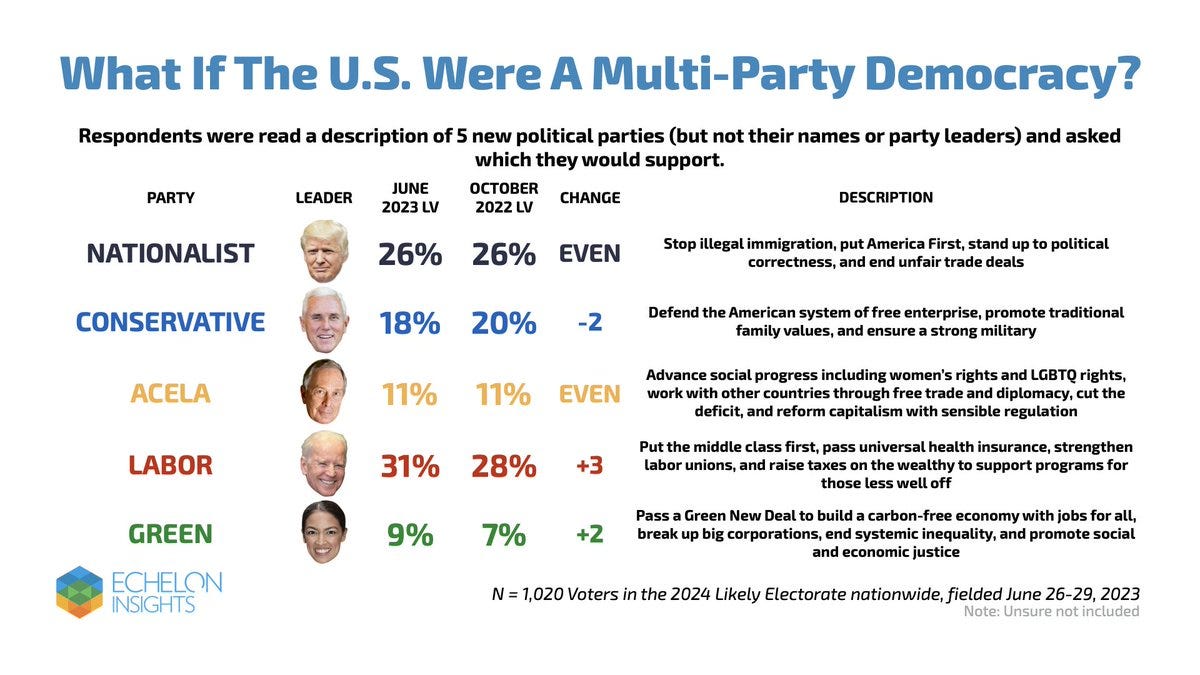How well does Congress align with the country?
New data allows us to compare American public attitudes with congressional voting records.

Good morning! It’s Thursday, May 2, 2024. Election Day is 187 days away. If this newsletter was forwarded to you, subscribe here. If you want to contribute to support my work, donate here.
Last month, in a piece about No Labels and attempts to shake up the American party system, I wrote that the U.S. essentially has the skeleton of a multi-party system already — just with several “mini-parties” operating under the roofs of the two big parties.
Enough separates Donald Trump from Mike Pence, or Joe Biden from Alexandria Ocasio-Cortez, to say that — even if the two parties normally vote as blocs — they functionally hail from different factions. With that in mind, in a follow-up piece, I argued that in order to ensure public policy that broadly mimics public opinion, political reformers’ time would be better spent trying to update Congress’ rules and norms to facilitate more cooperation between the existing “mini-parties” rather than going through the laborious process of building them out into bona fide political parties.
In this Congress, we’ve already seen a bit of what this could look like: recent votes on FISA reauthorization and foreign aid were essentially exercises in allowing the “mini-parties” to gang up and cobble together majorities for widely-backed policies, without the big parties whipping their members to vote for or against the measures. But, of course, on most votes, the “mini-parties” are not empowered in this way; or, more often, the bills that would lend themselves to such multi-partisan coalitions are not allowed to reach the floor.
As former House Speaker Paul Ryan once said: “We basically run a coalition government without the efficiency of a parliamentary system.”
However, for this argument to hold up, the “mini-parties” would need to already be electing members to Congress in numbers roughly equal to their proportions of the population. If they’re not, then the policy that comes out of Congress in my schema will still be out of whack with what the American voters want — and a true multi-party system with proportional voting, which would ensure proper representation of each “mini-party,” would be necessary.
In my original piece, I included the following data from Echelon Insights and argued that the makeup of Congress did, in fact, feature a basically similar breakdown already:
But, as I acknowledged in the piece, that assertion came mostly from eyeballing and considering the numbers of lawmakers in groups like the Republican Study Committee and the Congressional Progressive Caucus, an admittedly imprecise measure.
This morning, a better dataset came out to test my hypothesis that, even though we only technically have two parties, Congress is already split approximately how it would be if we had a multi-party system.
The data comes from FiveThirtyEight, who analyzed congressional voting records — a better metric than caucus memberships — and divided the 435 members of the House into eight groups. I condensed these groups into the five used by Echelon Insights to asses voter sentiment, placing FiveThirtyEight’s “Progressive Democrats” into Echelon’s “Green” faction; “Core Democrats” into the “Labor” faction; “Moderate Democrats” and “Moderate Republicans” into the “Acela” faction; “Compromise Conservatives” and “Old Guard Republicans” into the “Conservative” faction; and “Far-Right Establishment” and “Far-Right Obstructionists” into the “Nationalist” faction.
Once you do that, here’s how the current “mini-party” breakdown of the House compares to the percentages of American voters who say they fall into those factions:
It’s not perfect, of course, but it looks fairly representative! Most notably, the “Green” faction is somewhat over-represented — but, it should be noted that the Echelon Insights and FiveThirtyEight categories don’t map onto each other exactly. Some of FiveThirtyEight’s “Progressive Democrats” (like Jerry Nadler or Jim McGovern) are probably better fits for Echelon’s “Labor” faction.
Still, as a rough approximation, they line up pretty well, and give us strong data with which to compare the stated policy positions of American voters with those of the House members they send to Washington.
The FiveThirtyEight data is here if you want to play around with it. After comparing the two datasets, I’m even more convinced that creating a formal multi-party system with proportional voting isn’t necessary to create a representative Congress. Due to a mixture of factors, the makeup of Congress has already landed fairly close to what it would be in such a system; a better use of reformers’ energy, then, is to normalize a more fluid Congress where members of the current “mini-parties” can work together to build dynamic coalitions around pieces of popular legislation.
More news to know.

Middle East: The U.S. and Saudi Arabia are closing in on a historic defense pact and could strike a deal “within weeks,” according to Bloomberg. Once the accord is reached, the two countries are expected to offer Israel the opportunity to join, giving the Jewish state the chance to formalize diplomatic ties with the most powerful Arab state — if Prime Minister Benjamin Netanyahu agrees to a pathway for Palestinian sovereignty.
Meanwhile: More reporting has emerged about the concessions made by Israel in its latest ceasefire proposal. Per the New York Times, under the proposal, “Israel would allow displaced Palestinian civilians to return to northern Gaza,” something the country had previously resisted. However, Netanyahu told Secretary of State Antony Blinken on Wednesday that he won’t accept a deal that requires a permanent end to the war, another Hamas demand. Hamas has yet to respond to the proposal.
Abortion: The Arizona Senate voted Wednesday to repeal the state’s near-total abortion ban, an 1864 law that was upheld by the state Supreme Court last month. The bill, which was supported by all 14 Democrats and two Republicans in the chamber, was already passed by the state House last week and now goes to Gov. Katie Hobbs (D-AZ) for her signature.
What now: Once Hobbs signs the bill, the state will revert to a 15-week abortion ban that was approved in 2022. Arizona, a key battleground state, is likely to have a measure on the ballot in November that would reverse that statute, too, and protect abortion rights through around the 24th week of pregnancy.
Economy: The Federal Reserve once again held interest rates steady at their current 23-year high, citing a “lack of further progress” in combatting inflation.
Education: “Normally a time of celebration for high school seniors, this spring has been marred by the federal government’s botched rollout of the new FAFSA application,” the Associated Press reports. “By May 1, students usually know where they’re headed to college in the fall. This year, most still haven’t received financial aid offers. Three months before the start of fall classes, many don’t know where they’re going to college, or how they’re going to pay for it.”
Congress: Some House Republicans who voted for the Ukraine aid package are encountering much less backlash in their districts than they expected, the New York Times reports.
Main Justice: Top Biden Justice Department official Kristen Clarke testified during her confirmation that she had never been “arrested for or accused of committing a violent crime against any person.” But, according to the Daily Signal, she was arrested in 2006 for attacking her then-husband. (The charges were later dismissed and then expunged.) Clarke told CNN that she was “subjected to years-long abuse and domestic violence” by her ex-husband and that she didn’t believe that she was “obligated to share a fully expunged matter from my past.”
Tech: The Biden administration may need help from Elon Musk’s Starlink to fill gaps in its $42 billion program to bring high-speed internet to every American home.
On the trail: Joe Biden is looking weaker in both the Rust Belt and the Sun Belt... Biden’s jabs at Donald Trump are getting more personal... The Trump campaign is worried about RFK Jr.’s friendly treatment on conservative media... Trump is courting the libertarian vote... Trump and Nikki Haley have still yet to speak to each other... RFK Jr. says Biden should drop out.
Uh oh: “Biden calls U.S. ally Japan ‘xenophobic,’ along with China and Russia” (NBC News)
The day ahead.
— President Biden will travel to North Carolina, where he will meet with the families of the four law enforcement officers killed this week in Charlotte and deliver remarks on infrastructure in Wilmington.
— Vice President Harris has nothing on her public schedule.
— The Senate will hold a procedural vote on the bipartisan bill to reauthorize the Federal Aviation Administration (FAA).
— The House has cancelled votes for the day so members can attend the funeral of the late Rep. Donald Payne Jr. (D-NJ), who died last week at age 65.
Before I go...
Here’s something fun: The Hawaii legislature passed a bill Wednesday recognizing the “shaka” as Hawaii’s official state gesture.
“Historians trace the most well-known origin story of the shaka back to 1912,” Hawaii News Now reports. “Sugar mill worker Hamana Kalili used to wave with only his pinky and thumb after losing his three right middle fingers in an industrial accident in Laie.”
According to The Economist, it would be America’s first state gesture, joining a “rich and varied list of symbols across the country” from Maine’s state treat (the whoopie pie) to Washington’s state sport (pickleball) to New Mexico’s state aroma (the smell of “green chile roasting in the fall”).
The “shaka” bill has now been sent to Gov. Josh Green (D-HI) for his signature.
Thanks for reading.
I get up each morning to write Wake Up To Politics because I’m committed to offering an independent and reliable news source that helps you navigate our political system and understand what’s going on in government.
The newsletter is completely free and ad-free — but if you appreciate the work that goes into it, here’s how you can help:
Donate to support my work or set up a recurring donation (akin to a regular subscription to another news outlet).
Buy some WUTP merchandise to show off your support (and score a cool mug or hoodie in the process!)
Tell your family, friends, and colleagues to sign up at wakeuptopolitics.com. Every forward helps!
If you have any questions or feedback, feel free to email me: my inbox is always open.
Thanks so much for waking up to politics! Have a great day.
— Gabe





